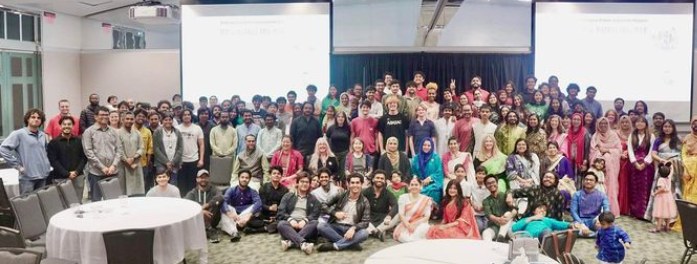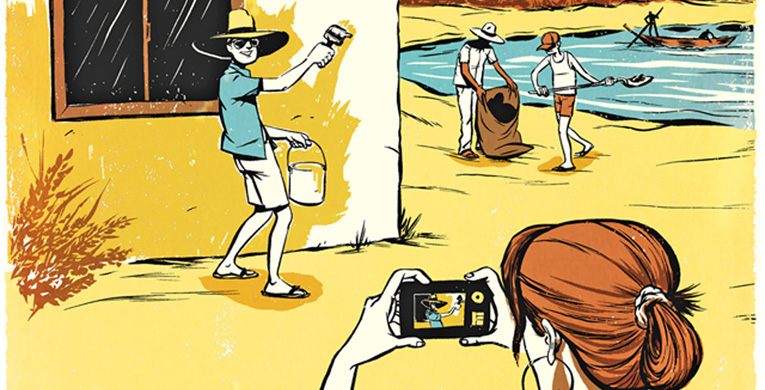
As I scroll through my Facebook, hashtags begin to appear, like #blessed #takemeback #lovethesekids #myheartsin.
After seeing enough selfies, I begin finding these posts rather disconcerting and wonder if the people in the pictures would care so much about #service if they could not post on social media about it. For this Mississippi girl, personal service promotion is a private annoyance, but for others across the globe whose lives are touched by the phenomenon known as voluntourism, it can be either a major #blessing or a major #problem.
Volunteer tourism, or ‘voluntourism,’ is a type of travelling where the volunteer pays to travel and help in the area he or she visits. While there, he or she might sightsee or participate in local activities and customs. Volunteer tourism targets the young and eager to help, who in return spend millions of dollars to help their fellow man.
According to NPR, voluntourism is a quickly growing industry, with 1.6 million westerners travelling outside the U.S. and spending about $2 billion a year. Voluntourism can be a major revenue source for travel companies who look to the 20-25 year old – the typical college student – demographic as their customers, said consulting group Tourism, Research and Marketing.
So, why not target young adults as a source of labor to help with charity work? Typical college students possess able bodies, minds or both, are looking to expand their horizons and often need to meet service requirements. High schoolers and college graduates also fit the requirements of a voluntourist and are eager to get out into the world. A company that advertises the ability to travel safely, change the lives of the less fortunate and do it all for less than a traditional vacation would cost is extremely appealing both to young adults and their parents.
What volunteers might not understand is how their desire to help can actually be harmful for a number of reasons. According to Al Jazeera, about 70 percent of Cambodia’s “orphans” actually have at least one living parent, but these adults give up their children believing that rich volunteers coming to the country will give them a better life than they could provide. Knowing that someone else will swoop in and take care of a problem takes away local initiative.
Voluntourism can hurt local economies in this way, as local populations come to expect the food, medicine or old t-shirts donated by a foreign church group. There is an incentive to not buy at local markets when a week later, a group of foreign volunteers toting piles of donated items will arrive.
Pacific Standard Magazine ran the story of Lauren Caskac, a volunteer who traveled to Africa on medical mission trips, but learned that the locals in Ghana, where she volunteered, would not buy medical insurance because they knew that outside groups would constantly come to fulfill their medical needs.
Sadly, these voluntourism trips also have the power to affect how we, here in the U.S., think. The first time I saw photos of my friends on service trips, it lit a sort of fire in me to go along, to help the children who so desperately needed love and attention. But the more of these photos I saw, the more I realized the focus was not on the people of that area, but on the volunteer his or herself.
It became about their experience, the power that they had to help the poor, unfortunate child of a third-world country.
It is not intentional, but it is, sadly, a type of savior complex that grips cultures. Just as Europe wanted to civilize the Western Hemisphere and its populations, we also attempt to bring culture and technology to the uncivilized, the less fortunate that we have the responsibility to protect and educate.
Does a volunteer think this way? No. Is it at least somewhere inherent in voluntourism? Sadly, yes.
Not all volunteer work is negative, however. Often, it brings positive change to the area.
Betsy Mercier, a junior elementary education, took a volunteer trip to Haiti. The trip was not outlandishly expensive, roughly $1,000, and she and several others spent a week teaching those in their area how to install, utilize and care for water filtration systems. Organized through a church, there was also a religious component of evangelization.
Unlike other voluntourist programs which offer more “tourist” activities, Mercier said she spent most of her day working. “If we weren’t doing the mission with filters we were either eating lunch, dinner, sleeping or riding the bus,” Mercier said. “We got up around 7 every day and were out until 5 or 5:30 distributing these filters.”
Mercier said one of the positive effects was the recognition that people living in the U.S. do have much easier lives than those living in other countries. “These families gave me hope to go back to Haiti and try and spread the word about how fortunate we really are,” Mercier said.
By sharing her story, Mercier will help combat feelings of American entitlement.
What is difficult about addressing voluntourism is the fact that volunteers no doubt mean well, but there are still repercussions. I very seriously doubt that any of the individuals I know who have gone on trips like this did so for personal gain. I doubt they took action with the intent to hurt local populations.
These trips, however, have very serious consequences, and it is imperative to consider all outcomes of your travel and spending before agreeing to be a part of one of these efforts.
I have always wondered why people travel so far to help others. Groups from Alabama will travel to New Orleans to help volunteer efforts, while an organization from northern Louisiana, meanwhile, will head to Birmingham to work with inner-city kids. While traveling, especially out of the country, does assist in eliminating ingrained ideas of right-ness and cultural norms, it does not address the fact that people in your backyard need help.
Want to feed orphans? Donate to your local orphanage instead of travelling to Cambodia. Desiring to clothe the homeless? I bet there is a man down the street who could use that T-shirt.
Just looking more closely into the voluntourism phenomenon has been an eye-opener for me. I personally love being involved in service work, but I now have a renewed commitment to responsible volunteering.
It is my hope that before you hop on the next available flight to a third-world country, take the time to consider all the ways your voluntourism might affect the community you are visiting, both the good and the bad.






























